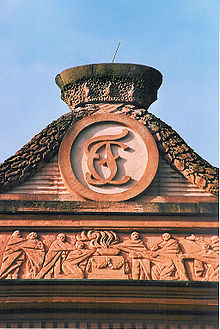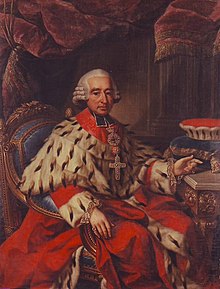Friedrich Karl Joseph von Erthal
Friedrich Karl Joseph Imperial Baron von Erthal (born January 3, 1719 in Mainz , † July 25, 1802 in Aschaffenburg ) was the penultimate Elector and Archbishop of Mainz and Prince-Bishop of Worms from 1774 to 1802 .
During his term of office, the fall of the old electoral state and the Archdiocese of Mainz began . His younger brother Franz Ludwig von Erthal was Prince-Bishop of Würzburg and Bamberg . His older brother Lothar Franz von Erthal (born November 12, 1717 in Lohr am Main; † December 4, 1805 in Aschaffenburg) was the Electorate of Mainz and court president and governor of Aschaffenburg
Prehistory and election of bishops
Erthal was born as the son of the Electorate of Mainz, Oberamtmann von Lohr, Philipp Christoph von und zu Erthal from the Franconian noble family von Erthal and his wife Maria Eva von Bettendorff . Sophie von Coudenhoven , whose mother, Charlotte Sophie von Hatzfeldt, née Bettendorf, was his cousin, became his confidante at the Mainz court. His predecessor, Archbishop Emmerich Joseph von Breidbach-Bürresheim , brought ideas from the Enlightenment into his term of office and was therefore extremely popular with the people. After his death, the Mainz cathedral chapter was split into two camps: one part represented the Enlightenment's openness to reform, the much larger other part stood for immediate restoration .
Immediately after the death of Archbishop Emmerich Joseph, the first measures were taken to suppress the Enlightenment in the teaching and monastery institutions of the Archdiocese. The cathedral curator Friedrich Karl Joseph von Erthal was also commissioned to do this . He was elected the new archbishop on July 18, 1774, which caused the citizens to fear that the Enlightenment was now collapsing again. Erthal, who was also elected Bishop of Worms a little later , raised people who were hostile to the Enlightenment to important posts, e. B. to the chair of the prefect for the school system. Thus he prevented the admission of educational teachers to schools.
Empire Politically, both had Nuncio of the Pope as well as Emperor Joseph II. Calculated that Erthal would bring an improvement in relations. But this did not happen. In his endeavors to play an important role in imperial politics as Arch Chancellor himself, he soon distanced himself from the emperor, whose dynastic interests could not please the electoral prince. On October 18, 1785, he even joined the almost exclusively Protestant Prussian Prince League. But the great confessional contradictions within the Federation and the Prussian politics (power struggle with Austria, dualism ), which are based on their own interests , made this approach of the Elector a far-sighted decision.
Elector Erthal and his relationship to the Enlightenment
In the cathedral chapter, too, the archbishop increasingly lost support. As it turned out soon after the election, Erthal was by no means the end of the Enlightenment. As early as December 1774 he set up a commission for the reform of the rural school system, which was dominated by reformatory and moderate Enlightenment forces. In 1777 Erthal returned to the modern administration of his predecessor and promoted the poor, hospital and welfare system. Church and university politics were also based on a moderate (i.e. not radically rationalistic) Enlightenment. In favor of the University of Mainz , whose rector he had been from 1757 to 1763, he dissolved hardly any existing monasteries and used their assets for the existence of the financially troubled institution. On November 15, 1781, the three richest Mainz monasteries - Altmünster , Kartause and Reichklara - and their entire assets were transferred to the newly founded university fund that still exists today. His auxiliary bishop Johann Valentin Heimes , who was responsible for the reform of the educational system in the vicariate general, played a decisive role in this .
By 1781 at the latest, Erthal's policy was completely shaped by the Enlightenment. He had the universities of Mainz and Erfurt reformed according to new ideas and published a hymn book in German. Politically, Erthal tried to strengthen the position of the metropolitan and to enable a rapprochement with the Protestants. The long-term goal should be a Catholic German national church. However, such considerations could not be enforced at the time. Most of the bishops feared the expansion of metropolitan authority. Bishops who could befriend this were opponents of rapprochement with Protestantism. In 1786 he gave the writer Wilhelm Heinse a job as a reader and later as an archiepiscopal librarian.
When Erthal realized that his goals could not be implemented, he soon lost interest in imperial politics. He and Karl Theodor von Dalberg , who was elected coadjutor (with the right of succession) on June 5, 1787 , started a few more initiatives, but the force of the events that were now beginning pushed them all into the background. In the face of the French Revolution , the old structures were on the verge of collapse.
Effects of the French Revolution

In 1792 the revolution reached Mainz . In the same year Emperor Leopold II (1790–1792) died. Erthal crowned his successor Franz II , the last Emperor of the Holy Roman Empire , as king in Frankfurt am Main . The last Prince's Day of the empire then took place in the Mainz Favorite , the summer residence of the Archbishops of Mainz. Shortly before, the empire had declared war on revolutionary France. Erthal joined the alliance despite warnings and thus initiated the demise of the archbishopric and its electoral state, which had existed since 782.
The French invaded the empire; On October 22, 1792, Mainz, the residence and fortress city of the most senior elector in the empire, surrendered without a fight. The archbishop and the cathedral chapter left the city. By July 1793, the era of the Mainz Republic , which was shaped by the Mainz Jacobin Club and is considered to be the first democracy on German soil, began.
The war raged on for a few years, but the Reich could not win it. In the Peace of Campo Formio , Austria granted France the cession of the areas on the left bank of the Rhine, to which Mainz also belonged. Erthal was already living in his second residence, Johannisburg Castle in Aschaffenburg . With the Concordat of 1801 , Napoleon reformed the church on the left bank of the Rhine with the approval of the Pope. The archbishopric remained formally for the time being, but in fact the diocese of Mainz, which Napoleon circumscribed , now existed with Bishop Joseph Ludwig Colmar at its head.
Erthal therefore tried to at least save his electoral state, which he did not succeed either. However , he did not live to see the final dissolution of the old structures through the execution of the Reichsdeputationshauptschluss . On July 4, 1802 he resigned from all offices and handed them over to Archbishop Karl Theodor von Dalberg . A little later, on July 25, 1802, Erthal died in Aschaffenburg and was buried there in the collegiate church of St. Peter and Alexander . The primary and secondary school in Erthalschule in Leider and a street in Aschaffenburg are named after him, as is Erthalstraße in Mainz and consequently also the Erdal shoe polish, which is named after it in Mainz pronunciation .
coat of arms
The coat of arms of the Elector-Archbishop of Mainz and Prince-Bishop of Worms shows a black cross bordered in narrow silver with a golden glaive (Deutschordenskreuz), a silver wheel ( Mainz wheel ) in fields 1 and 4 and a black wheel in 2 and 3 Slanting silver key, the beard of which points to the right and is accompanied by golden crosses (shingles) (Hochstift - Diocese of Worms). The heart shield, in gold a black, silver-armored eagle, this bears the family coat of arms as a breast shield; quartered by red with two silver bars and blue.
Individual evidence
- ↑ Werner Loibl: The father of the prince-bishop Erthals - Philipp Christoph von und zu Erthal (1689-1748) . Publications of the history and art association Aschaffenburg eV edited by Heinrich Fußbahn. Volume 64. Aschaffenburg 2016. ISBN 978-3-87965-126-9 , u. a. P. 93.
- ↑ 225 years of the Mainz University Fund Foundation; Festschrift for the 225th anniversary of the Mainz University Fund Foundation 1781-2006
- ↑ A personality of the enlightened reform movement in Mainz Ceremony for the 200th anniversary of the death of the Mainz auxiliary bishop Johann Valentin Heimes by Werner Guballa
- ^ Friedrich Carl Joseph Reichsfreiherr von Erthal. Aschaffenburg Online, accessed January 28, 2014 .
literature
- Emanuel readers : Friedrich Karl Joseph, Freiherr von Erthal . In: Allgemeine Deutsche Biographie (ADB). Volume 7, Duncker & Humblot, Leipzig 1877, pp. 552-557.
- Heribert Raab : Friedrich Karl Frhr. v. Erthal. In: New German Biography (NDB). Volume 5, Duncker & Humblot, Berlin 1961, ISBN 3-428-00186-9 , p. 517 f. ( Digitized version ).
- Bernd Blisch : Friedrich Carl Joseph von Erthal (1774–1802): Archbishop - Elector - Archchancellor. Studies on Kurmainzer politics at the end of the Old Empire. Peter Lang, Frankfurt am Main 2005 (= Mainzer Studies on Modern History. Volume 16), ISBN 978-3-631-53913-2 .
- Hans-Bernd Spies: Friedrich Carl Joseph Freiherr von Erthal - 1719–1802. Small cultural and social history studies in his time. Verlagdruckerei Schmidt, Neustadt ad Aisch 2002.
Web links
- Literature by and about Friedrich Karl Joseph von Erthal in the catalog of the German National Library
- Works by and about Friedrich Karl Joseph von Erthal in the German Digital Library
- Josef Schweigard: The moral of reason. In: Die Zeit , 2007: 29: 82 from July 12, 2007 (dealing with the enlightened theology of Felix Anton Blau (1754–1798))
- 225 years of the Mainz University Fund Foundation; Festschrift for the 225th anniversary of the Mainz University Fund Foundation 1781-2006
- Erthal Obelisk in Erfurt (Monuments in Erfurt, 2011)
| predecessor | Office | successor |
|---|---|---|
| Emmerich Joseph von Breidbach zu Bürresheim |
Elector Archbishop of Mainz 1774–1802 |
Karl Theodor von Dalberg (only on the right bank of the Rhine) |
| Emmerich Joseph von Breidbach zu Bürresheim |
Prince-Bishop of Worms 1774–1802 |
Karl Theodor von Dalberg |
| personal data | |
|---|---|
| SURNAME | Erthal, Friedrich Karl Joseph von |
| ALTERNATIVE NAMES | Erthal, Friedrich Karl Joseph Reichsfreiherr von (full name) |
| BRIEF DESCRIPTION | Elector and Archbishop of Mainz |
| DATE OF BIRTH | January 3, 1719 |
| PLACE OF BIRTH | Mainz |
| DATE OF DEATH | July 25, 1802 |
| Place of death | Aschaffenburg |



